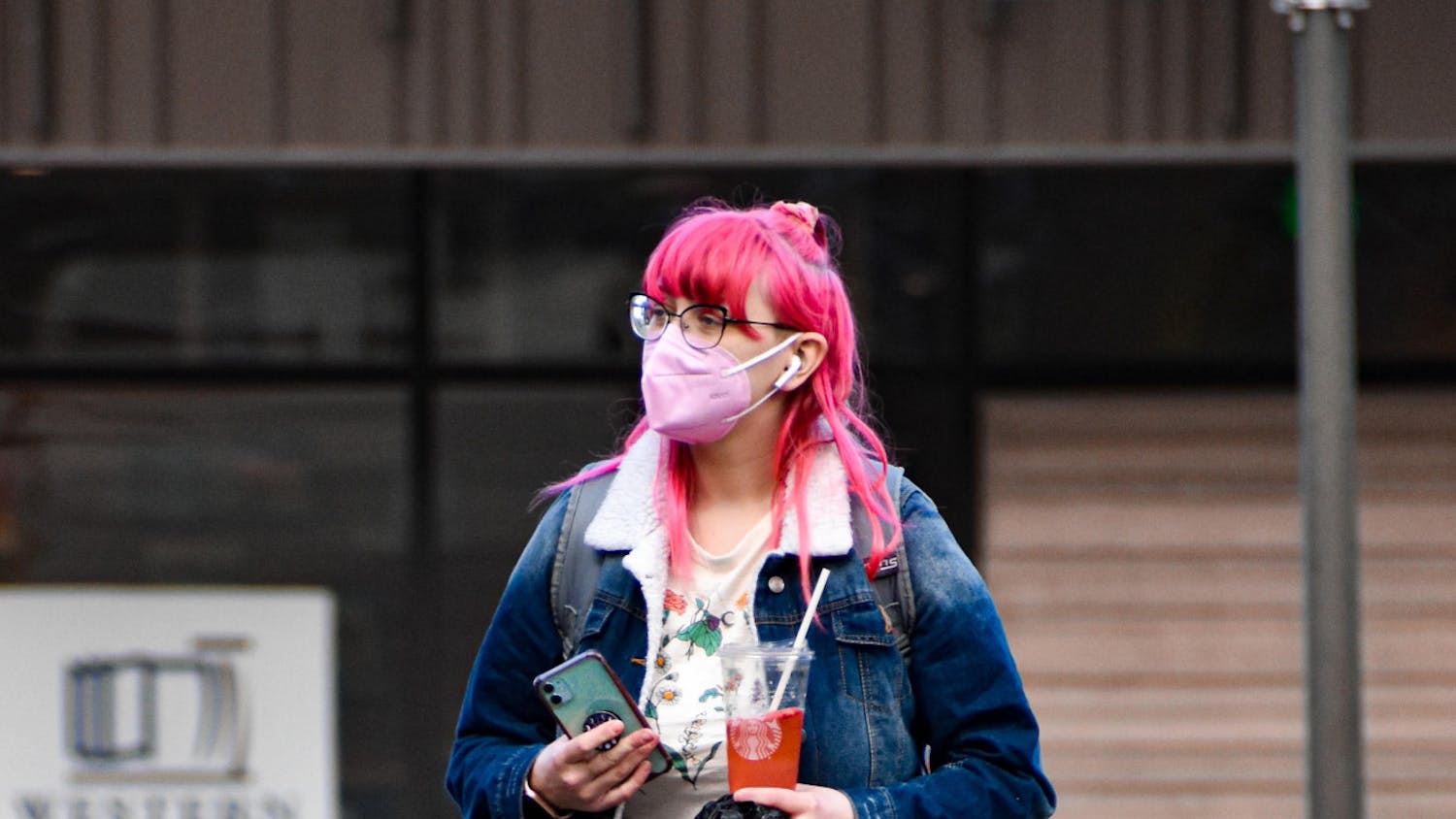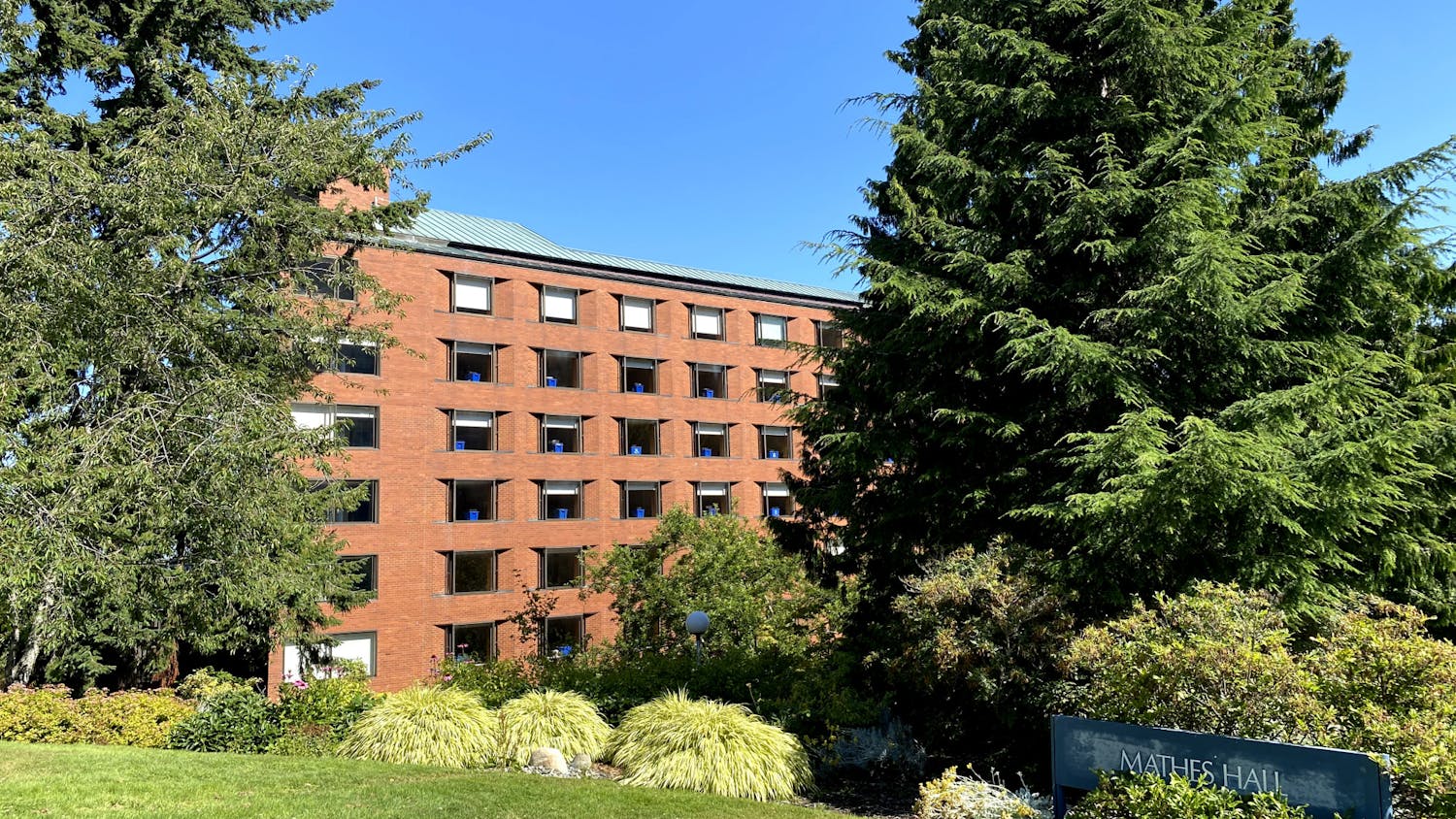Content Warning: This article contains language that may be triggering or traumatizing to some readers. CW: reference to racial slurs
Silvia Leija’s first day of college was a big family event. Sixteen people helped move her into her dorm.
“I was like, ‘Do you want to come with me?’ They all said yes,” she said.
Leija was the first in her family to go to college, so move-in day was exciting for everyone.
“My mom brought us all into this room in Edens – it's this beautiful glass room,” Leija said. “She closed the door and we prayed. ’Cause that's what my mom does. She prayed for me and so did the rest of my family.”
As Leija walked her family out, a student she had never met came up to her. She told Leija that it was “exotic” of her to speak Spanish there and that it might be “dangerous.”
Edens Hall is designated as a residence hall for students in Western Washington University’s Honors College – a program that Leija had been accepted into as she entered her first year at Western.
Western’s Honors College is a selective community. They received about 1,100 applications for the upcoming academic year and accepted about 250 students, according to Honors Director and geology professor Scott Linneman.
The Honors College provides a differently structured college experience for students. Each first-year cohort lives together on North Campus in the “E-Higgy” community, the Edens and Higginson residence halls that are prioritized for honors students. They take small honors-only classes together, often fulfilling General University Requirements. During their senior year, honors students work on senior projects that represent a culmination of their learning.
After numerous other instances in which she didn’t feel safe in Edens Hall, classrooms or the honors community, Leija met with honors staff and faculty to create the Honors Students of Color in 2019, her first year of college. She is now in her fourth and final year at Western, graduating with a degree in public relations this spring.
HSOC became a safe space for students of color and a community for advocacy and social justice. They meet regularly on Mondays and have hosted a variety of events such as presentations on intersectionality, movie nights and yoga.
Leija also founded the Honors Mentors program. This program allows incoming honors students to find a friend, guide or occasional support when it is needed.
Originally, Leija focused the mentorship on translation services for families who don’t speak English. However, after meeting with other HSOC members throughout the COVID-19 pandemic, she ultimately decided to expand beyond translation. The Honors Mentors are now available for any incoming students of color or first-generation students who need help navigating a new space.
The Honors College Latin emblem reads “Societatem colimus pro scientiam humanitus enitente,” on their website homepage. In English, it means “we cultivate community by striving compassionately for knowledge.”
However, the honors community has not been an inviting space for all students.
“Every time I walk into a new class, I count how many students of color there are. It’s extremely lonely,” said Sargun Handa, a third-year student at Western and Student Advocacy Representative for HSOC.
On Feb 1, HSOC released a list of 10 demands to the Honors College. The group also created a petition to bring attention to their demands in response to the racism and neglect the students felt within the honors community.
Since then, HSOC students said progress toward meeting demands has been slow. All of the demands touch on changes HSOC members have been working toward for years, students said.

Honors Students of Color (HSOC) Student Advocacy Representative Silvia Leija (left) stands next to HSOC President Olivia Dong (right) in the courtyard of the Viking Union on April 14. Leija founded HSOC in her first year at Western Washington University in 2019. // Photo by Simone Higashi
ENDING THE USE OF THE N-WORD
The first demand in the document is “ending the usage of the N-word by non-Black students, staff, faculty and administration in the honors program.” It says that there must be repercussions for people who violate this rule.
It is widely agreed upon that usage of the N-word by non-Black people is offensive. However, the debate on whether it is acceptable to say in academic contexts still exists.
In Leija’s second year at Western, she witnessed a white student read the N-word aloud in an honors course called “Bridging the History Gap: Reading the Obama Years.” She later emailed the professor, Richard Simon, about the incident.
“As you probably know, the N-word holds a long history of pain and oppression for Black Americans and it’s not our word to use in any instance, even academically,” read Leija’s email.
During the reading of another book in Simon’s class, “Stony The Road” by Henry Louis Gates Jr., a student pronounced the N-word in its more widely debated form, “N**ro.”
“While [n**ro] may be no longer appropriate to use conversationally, it is not broadly considered a violation of cultural norms to pronounce when reading a historical text such as Gates’ book, or Dr. Martin Luther King Jr.’s ‘I Have a Dream’ speech,” Simon said.
Yet, the use of the word still made students uncomfortable. When Leija brought up the situation with an honors faculty member they said, “Sometimes we just have to take it as people of color,” according to Leija.
“I was like, ‘I don't want to take it though,’” she said. “This is really harming my mental health.”
This was not the only time where an HSOC student witnessed a non-Black professor or student say the N-word in class, according to Handa.
Section two of appendix five of the WWU Faculty Handbook encourages faculty to acknowledge and be sensitive toward students of marginalized identities.
“We recognize that in addressing the inequities of our social system, the United States Constitution has limitations,” the handbook says. “We also support student efforts to transform our university and all societal institutions in ways that dismantle those inequities.”
After HSOC members contacted Linneman about their first demand, he responded by citing the handbook.
“I suspect that you may not find this satisfying (the BSU students didn’t!), but the 1st Amendment is the law of the land,” read Linneman’s email to third-year Western student and HSOC president, Olivia Dong.
Linneman said that he too was frustrated with the constraints he faces in enacting a code of conduct for the Honors College. As of May, no new code of conduct or repercussions have been set forth by the Honors College.
STAFFING AND CURRICULUM REFORM
Staffing is a large focus within the HSOC demands. Demands two and three call for a new staff position to specifically deal with diversity, equity and inclusion, a paid student assistant with experience in DEI and for more faculty and staff of color.
These demands also stipulate that HSOC students and mentors must be present during the hiring process. The hiring of new staff within the Honors College is currently overseen by the Honors Advisory Board in which HSOC students hold two positions. Demand number nine calls for those designated positions to be permanent.
Having diverse faculty and faculty of color is beneficial for many reasons. A big reason is the reduction of implicit bias against students of color, according to Vanessa Meraki, a racial equity specialist for the Department of Racial Equity Advancement in Seattle Public Schools.
As of 2021, 79.48% of Western’s faculty were white, according to data from the Affirmative Action Program for Women and Minorities, and 83.58% of Western’s staff were white. Faculty refers to educators at Western while staff is the term used for all other employees.
Hiring faculty and staff is a lengthy process. Affirmative action, budgeting and convincing non-tenure-track scholars to move to Bellingham to teach are all hurdles in the process of hiring specific faculty of color, according to Linneman.
“At the end of the day what I believe BIPOC students really want is more people like them in positions of power and more people like them in the classroom,” said Associate Professor Lysa Rivera during a WWU Faculty Senate meeting on April 4.
HSOC was dissatisfied with the Honors College and Linneman’s response to the demands for diversity in hiring.
“It would be nice if he even just said like, ‘I will commit in the future round of hiring to hire a staff member of color’ or something, or keep diversity as a priority,” Dong said.
The biggest advancement on the way to meeting this demand is the proposed DEI specialist position. However, this position was set forth before the demands were published and is not a direct response to HSOC.
Reforming the honors curriculum with special emphasis on the first-year sequence is demand number eight.
“Whenever I would bring up things as an Asian adoptee, it would get pushed over by the topic of women,” HSOC member Alex Park said, recalling their experience in Honors 103, one of the first-year sequence classes. “There are predominantly white people in honors, so talking about race would make it more uncomfortable for those students.”
Curriculum reform is more than just lesson plans and reading assignments. It pertains to the way professors teach, how information is presented, grading, student resources and more.
“How do you help people develop a lens so that they are seeing things in ways that they haven’t seen them before?” explained Dr. Caprice Hollins.
Hollins is the co-founder of Cultures Connecting, a Seattle-based company that provides training, consulting, coaching and much more for race relations in professional settings.
Honors staff have told HSOC members that they are working on reforming the first-year sequence and Honors 101, but their communication has been minimal, according to Park.
“Many people do undo their internalized and learned racism and it takes a certain will,” Meraki said. “I think that that will must become a prerequisite for all educators.”
FINANCIAL REPARATIONS
“Financial reparations” is a term most commonly used in reference to governments giving money to Black Americans in restitution for slavery and other historical injustices. HSOC’s call for reparations is for more funding for HSOC, an annual honors scholarship for students of color and a DEI development retreat. This is HSOC’s fourth demand.
“If I have to put in $500 myself, I will do it. As long as it gets started,” Leija said about the call for an HSOC scholarship.
Little progress has been made toward students’ scholarship demands, partly because Western is required to comply with state law.
“If a donor decides a particular academic program is more important, they will have to remove the BIPOC requirement. In those instances, the awarding will remain within the college or department,” read an email from Vice President of University Advancement, Kim O’Neill, to university leaders.
This means that specific departments, like the Honors College, cannot award scholarships with priority to a particular race or gender.
“What we can do is if we raise money through donors it can go into the admissions scholarship pool which can be used to designate to people of particular demographics, but you can’t connect it to a particular program,” Linneman said.
This means that scholarships for students of color can be given out through the general university as a first-year admissions scholarship. However, this doesn’t guarantee that a student of color in the Honors College will receive that scholarship.
AFFINITY HOUSING
HSOC’s proposal for affinity housing within honors would focus on being a welcoming space for students of color, according to Jay Robles, second-year Western student and vice president of HSOC. Their specific deadline for this demand is October 2023 as this has been one of the group’s primary goals long before they wrote their demands. Affinity housing is demand number five.
Affinity housing refers to living communities surrounding specific subsets of identities. Colleges all over the US have implemented different types of this housing. Cornell University offers a variety of housing focused on identities ranging from the LGBTQ community to Akwe:kon, “the nation's first university residence hall established to celebrate American Indian culture and heritage,” their website says.
Western implemented Black Affinity Housing in 2021 which is located in Alma Clark Glass Hall, a newly constructed residence hall named after the first Black student to attend the university. This community provides students with a space of inclusion and dialogue “centering the Black experience,” according to the Black Affinity Housing website.
For Leija, affinity housing is a necessity.
“[Edens] was not a safe environment,” Leija said about her experience in the honors residence halls.
She combatted this feeling by holding events that were important to her and other students of color. She made a small restaurant out of her room serving Mexican food, celebrating Día de los Muertos, having viewing of the movie “Coco” and more.
Affinity housing would help students of color create the type of community Leija strived to make on her own. However, it may not be a simple process.
“I've been deprioritized and brushed off a lot,” Robles said. ”And not just me, but literally everyone who's worked on this.”
HSOC students have met repeatedly with honors staff and faculty to advocate for affinity housing.
“It is something that requires a lot of planning so we were trying to get on it right away,” Robles said. “But then it turned into ‘why don’t the [honors] mentors work these housing socials?’”
The housing socials Robles refers to were held on Zoom as a way for incoming honors students to get to know their peers before deciding who they would live with.
“Like, that’s great, but it doesn’t specifically address the needs for students of color,” Robles said.
Linneman is not sure affinity housing for students of color is something Residence Life will agree to.
“It is not clear whether the director there is interested in doing that,” he said.
For HSOC, living in a safe space is not about “interest,” it is about well-being.
“When you go back to your dorm, which is supposed to be like home, and you don’t feel safe and your suitemates don’t consider you or care to affirm your identity or listen to who you actually are, then where are you supposed to go?” Robles said.
DATA
HSOC students worked to create a climate survey to collect data on the experiences of students of color in the Honors College. This is demand number six.
“There have been a lot of instances where we bring up issues to the honors program and they’re like, ‘Well that's just one student of color’s experience. Not all students of color are in HSOC,’” Leija said. The climate survey would serve as data-driven proof of their experiences.
The questions were all drafted and written by HSOC students with support from a Fairhaven faculty member. When that faculty member went on leave, the survey was adopted by the Office of Institutional Effectiveness.
Since the survey was adopted by the OIE, members of HSOC have felt continually left out of the process, according to Robles.
The OIE plans to roll out the climate survey at the end of spring quarter to graduating honors students and students exiting their first year of the honors program.
Demand number seven calls for public access to dropout rates for students of color in honors, to show data on the diversity of the Honors College and retention rates comparing students of color to white students.
“It is a very STEM-based area and they want numbers to exemplify and to demonstrate experiences of pain and hurt that honors students of color are facing,” Leija said. “I think that's very weird that they can’t just take our word for these experiences.”
LOOKING AHEAD
Demand number 10 is immediate. It calls for “a reporting system in honors for students of color experiencing microaggressions and racism.”
Other than affinity housing and demand 10, HSOC’s deadline for the rest to be met is spring quarter 2024. If their demands remain unmet, they plan to take action against the Honors College.
These actions are listed in the demands document:
Reaching out to more publications with their story
Publishing a document that brings attention to specific instances of racism and the people who perpetrated it with formal Title IX reports
Contacting donors and alumni with their grievances
Breaking ties between HSOC and the Honors College
HSOC’s separation from the college would impact the honors program by bringing down its numbers for diversity, something Linneman said he was proud of in the Faculty Senate Meeting on April 4.
Every demand was born out of lived experiences of many students of color in the Honors College. The deadline exists so that future students do not have to endure the same things current HSOC students do, according to Handa.
The only demand that has a planned rollout date is number six, the climate survey. The rest have yet to be given serious timelines by honors faculty and administration as students and faculty continue to meet, according to HSOC students.
HSOC members also expressed their disappointment in how silent the Honors College has been to the public regarding their demands.
“White faculty, white students, white staff that are silent are not actually silent,” Hollins said. “In my mind, they are speaking very loud and clear that their silence is an action.”

HSOC Vice President Jay Robles (left) stands next to HSOC Student Advocacy Representative Sargun Handa (right) in the Multicultural Center on April 16. Handa authored the 10 HSOC demands earlier this year. // Photo by Simone Higashi

Simone Higashi (she/her) is a third-year News Editorial student and senior reporter for The Front. Simone likes to knit and read in her free time. You can reach her at simonehigashi.thefront@gmail.com.






